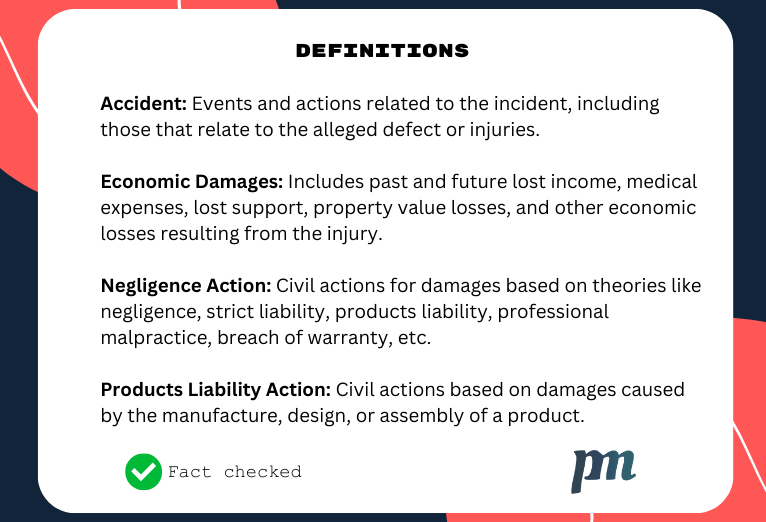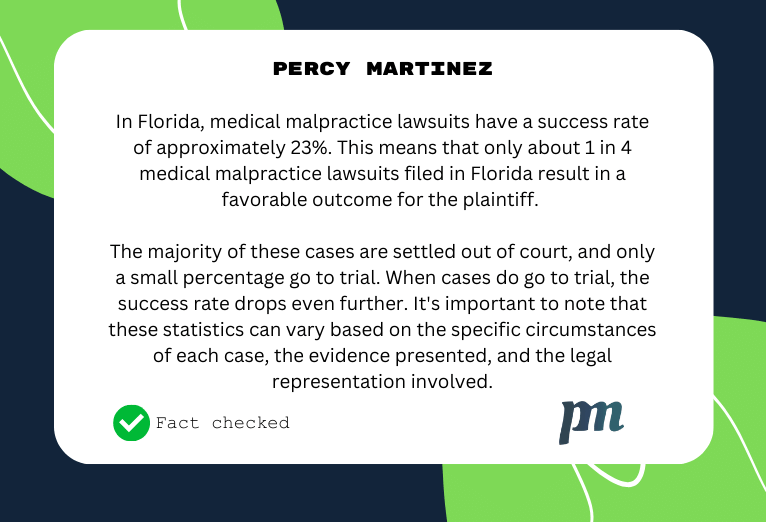Call: (800) 382-3176 or Chat with us
Who is Most Liable for Medical Malpractice in Florida? Key Facts and Figures
Medical negligence or medical malpractice is a complex area of law, particularly in Florida, where specific legal requirements must be met to successfully pursue a claim. Understanding the key players and responsibilities involved when medical negligence occurs can help you navigate the complicated process of seeking compensation for your injuries.
Medical malpractice happens in Florida when a healthcare provider doesn’t meet the accepted standard of care, resulting in harm to a patient. To establish who’s responsible, we need to look at what different parties, like doctors, nurses, and healthcare facilities, did. Staffing, working conditions, and the quality of care provided by medical professionals all play a big role in figuring out liability. It’s important to consider all these factors to find a fair resolution for your medical malpractice case.
Blog Summary
- Medical malpractice involves a breach of the standard of care, which leads to patient harm.
- Determining liability may involve evaluating the actions of physicians, nurses, and healthcare facilities.
- Numerous factors can contribute to a finding of liability in a medical malpractice case.

Understanding Medical Malpractice
In Florida, medical malpractice occurs when a healthcare professional, such as a doctor, nurse or medical facility, fails to act with the same level of care and competence that a doctor or another similar professional would have demonstrated in the same situation. This can lead to injury or harm to the patient, which constitutes medical malpractice.
Misdiagnosis or delayed diagnosis is a prevalent type of medical negligence. It occurs when healthcare professionals fail to accurately identify a patient’s condition, resulting in incorrect or no treatment at all. The consequences can be severe, leading to the deterioration of the patient’s condition and, in some cases, even death. Healthcare professionals must improve diagnostic accuracy and ensure timely treatment to prevent such unfortunate outcomes.
Medical malpractice can also involve surgical mistakes, such as operating on the wrong body part, leaving instruments inside a patient’s body, or causing unnecessary damage during a procedure. Furthermore, medication mistakes, like prescribing the wrong drug or administering an incorrect dose of anesthesia, can result in serious harm to the patient.
In the state of Florida, the parties accountable for medical malpractice are limited to doctors, nurses, nursing assistants, administrators, and other healthcare professionals who provide daily care to patients. Additionally, facilities can be held responsible if the injury or loss is attributed to unsafe or unsanitary conditions, or if it stems from negligent hiring practices. It is crucial to understand the scope of liability in a medical malpractice lawsuit to ensure the safety and well-being of malpractice victims.
To successfully pursue a medical malpractice claim in Florida, you must establish that the healthcare provider had a duty of care, breached that duty and the breach directly caused your injury. Additionally, you must be aware of the medical malpractice statute of limitations, which is set at two years from the time of the incident or discovery of the injury.
Parties Liable in Medical Malpractice Cases
Healthcare Providers
In Florida, healthcare providers such as hospitals, clinics, and other healthcare facilities can be held liable for medical malpractice if they fail to provide a proper standard of care to their patients. This includes cases where the healthcare provider breached their duty—as a result of negligence or recklessness—that leads to patient harm or injury. You should be aware that some healthcare experts could be held responsible for the actions or errors of their employees, including doctors, nurses, and other medical professionals.
Medical Professionals
Doctors, nurses, and healthcare professionals in Florida can also be held liable for their medical negligence or malpractice. When a medical professional injures a patient while delivering care that falls below the accepted professional standards, the practitioner may be considered liable. This includes situations like misdiagnosis and improper medical treatment.
Moreover, medical experts are not the only ones who can be held responsible for malpractice claims. In some cases, pharmacists, therapists, or technicians can be held liable if their actions, or lack thereof, directly contributed to the patient’s injury or poor outcome.
To summarize, both healthcare experts and medical professionals in Florida can be held liable for medical malpractice. It is essential to understand your rights and the responsibilities of these parties when seeking legal recourse in case of injury or damage from a medical procedure.

Medical Malpractice Laws in Florida
Florida medical malpractice laws are unique and can sometimes limit the options for patients seeking compensation. Understanding these laws can help you navigate the complexities of a medical malpractice case in Florida.
Statute of Limitations
In Florida, the statute of limitations for medical malpractice cases is typically two years from the time of the incident. This statute of limitations means that you have a two-year window to file your claim after discovering the injury or when the injury should have reasonably been discovered with due diligence according to Florida Statutes §95.11. It is essential to start any legal actions within this timeframe, or you risk losing your chance to seek compensation.
Damages and Compensation
In a Florida medical malpractice case, there are opportunities to seek compensation for damages. These damages can be divided into two categories: economic and non-economic. Economic damages include quantifiable expenses like lost wages, medical bills, and future medical costs. On the other hand, non-economic damages aim to compensate for subjective losses such as pain and suffering or emotional distress. It’s worth noting that Florida law does not impose a limit on the amount of damages that can be awarded.
Affidavit Requirement
One of the unique aspects of medical malpractice laws in Florida is the affidavit requirement. To prove your case of malpractice, you must provide an affidavit from a qualified medical expert who confirms that there is a reasonable basis to believe that the defendant healthcare provider’s negligence caused your injuries, as stated in the Florida statutes. This affidavit serves as an important piece of evidence in your case and helps to establish the validity of your claim.
By navigating these aspects, you can be more confident and knowledgeable when seeking compensation for your injuries. Don’t hesitate to seek legal help when dealing with such complex cases, and always stay informed about Florida legislature updates that may impact your situation.

Proving Medical Malpractice
Standard of Care
To pursue a medical malpractice claim in Florida, it is crucial to establish that the doctor or medical professional must provide a certain standard of care. This standard is determined by what a reasonably prudent medical professional with a similar background would have done while performing the same medical procedure under similar circumstances. It is important to note that this standard can vary depending on the specific field of medicine and other situational factors. Understanding these key aspects is essential when navigating a medical malpractice case in Florida.
Proximate Cause
After establishing the standard of care, the law firm’ next step is to prove that the negligent actions of the doctor or medical professional led to the patient’s injury. This is known as proximate cause. In other words, you must show a clear link between the doctor’s or medical expert negligence and the harm you have suffered.
When arguing your case, it is crucial to present evidence highlighting the discrepancy between the doctor’s actions and the acceptable standard of care. This can include expert testimony, medical records, and other documentation illustrating the practitioner’s negligent actions. Remember that it is not enough to state that a doctor’s actions did not meet the standard of care; you must also convincingly demonstrate how the negligence led to your injury.

Common Examples of Medical Malpractice
Surgical Errors or Mistakes
Surgical errors are one of the most common types of medical malpractice. These errors can occur at any stage of the surgery, from the initial preparation to the completion of the procedure. Mistakes made during surgery can lead to serious consequences for a patient, potentially resulting in injuries or even death. Examples of surgical mistakes include operating on the wrong body part, leaving surgical instruments inside the patient, or performing an incorrect surgical procedure. To avoid such issues, it is essential for healthcare experts to meticulously follow all medical procedures and surgical procedures themselves, maintain accurate patient history, and provide appropriate medical care.
Medication Errors
Another prevalent form of medical malpractice involves medication errors. These errors can occur during the prescription, administration, or dispensing of medications, and can lead to a patient receiving the wrong medication or the wrong dosage. Some common medication mistakes include drug interactions, incorrect labeling, or improper dosage calculations. Medical providers must carefully review medical records, verify patient information, and adhere to proper protocols to prevent medication errors. Malpractice insurance can help protect providers in the event of such errors; however, the primary goal should be ensuring the safety and well-being of the patient through diligent medical care.
Birth Injuries
Birth injuries are, unfortunately, another common example of medical malpractice. Injuries during childbirth may result from a variety of factors, including improper monitoring of the mother or baby during labor, failure to identify potential complications or inadequate action during an emergency. The consequences of these damages can be severe and may lead to long-lasting complications for both the mother and the baby. To guard against such issues, Health care providers must maintain a high standard of care, consulting with medical experts and closely monitoring the progress of labor and delivery. By adhering to best practices, healthcare professionals can help minimize the risk of injuries to the baby or mother and maintain the trust of their patients.

Legal Representation in Medical Malpractice
When facing a medical malpractice situation in Florida, it’s essential to seek the help of a Florida medical malpractice lawyer. Our experienced professionals have in-depth knowledge of the state’s medical malpractice laws, and they can help you navigate and file medical malpractice lawsuits.
First, your medical malpractice lawyer will evaluate your case to determine whether it meets the criteria for negligence. This includes establishing that there was a duty to the patient, a breach of duty, causation, and damages for patient injury caused by the breach. They will use their expertise to assess the evidence and advise you on the best course of action.
In addition to evaluating your case, a law firm specializing in medical malpractice will help you gather the necessary documentation and identify potential expert witnesses. These experts are crucial in proving that the healthcare provider failed to meet the medical standard of care, which is necessary for a successful medical negligence claim.
Your legal representation will also guide you through the pre-trial process. In Florida, this includes mandatory pre-suit investigations and a 90-day waiting period before a lawsuit can be filed 2. During this time, your lawyer will continue to gather evidence and prepare your case for litigation.
Finally, if your case goes to trial, your medical malpractice lawyer will act as your advocate in the courtroom, presenting evidence, questioning witnesses, and arguing your case before the judge or jury. Should your case result in a settlement or favorable verdict, they will also assist you in collecting damages to compensate for your losses and injuries.

Conclusion
In Florida, determining who is most liable in a serious medical malpractice law case can be a complex process. You should be aware that various parties can be held responsible, and successfully navigating a medical malpractice law case requires a deep understanding of the laws and facts involved.
The party most commonly liable in a malpractice suit is the doctor or healthcare provider who failed to provide the appropriate standard of care. As a patient, if you experience harm due to a medical provider or doctor’s negligence or incompetence, you might have a valid legal claim against them. However, it is important to note that a poor outcome from a medical treatment alone does not automatically constitute a malpractice suit.
Hospitals can also be found liable in a lawsuit. If the hospital’s staffing issues, employment conditions, or other factors contributed to your injury, the facility may share responsibility for your damages. Additionally, if any employee of the hospital or facility, such as a nurse or technician, contributed to your injury, the hospital could be held accountable.
As you pursue your medical malpractice claim in Florida, remember that the state has its unique rules and statutes of limitations. You should be aware of Florida’s damage caps and filing deadlines to ensure you navigate the process effectively. Generally, you have two years from the date of the incident to file a medical malpractice lawsuit, with some exceptions for cases involving minors and specific circumstances.
In conclusion, to determine who is most liable for medical malpractice in Florida, you must examine the specific circumstances of your case. Both healthcare professionals and hospitals could potentially be found responsible, and acknowledgment of Florida’s laws and limitations is essential for a successful claim.

Frequently Asked Questions
What are the common causes of medical malpractice in Florida?
Medical malpractice may occur due to various reasons. Common causes that constitute medical malpractice may include misdiagnosis, failure to diagnose, surgical mistakes, medication errors, and inadequate treatment. These instances occur when a healthcare professional breaches the standard of care that is generally expected within their medical field.
How do Florida malpractice laws determine liability?
In Florida, malpractice laws determine liability by examining whether the healthcare provider breached their duty of care, skill, and treatment toward the patient, leading to damages. The plaintiff must prove that the healthcare provider’s negligence directly resulted in the injury or harm suffered by the patient. If the hospital or medical professional is found liable, compensation can be awarded to the patient.
What role does insurance play in medical malpractice in Florida?
Florida requires healthcare providers to carry malpractice insurance or demonstrate financial responsibility to provide compensation in the event of a medical malpractice lawsuit. Insurance also covers defense costs during trials. In most cases, medical malpractice claims in Florida usually involve negotiations with insurance companies to settle.
How can a Florida malpractice attorney help prove liability?
A Florida malpractice attorney can help prove liability by thoroughly gathering and analyzing medical records to establish that the healthcare provider deviated from the accepted standard of care. They may also consult and secure expert witnesses to testify on the plaintiff’s behalf. These experts can demonstrate how the healthcare professional’s actions directly resulted in the patient’s harm, helping establish liability.
What factors influence medical malpractice settlement amounts in Florida?
Several factors influence medical malpractice settlement amounts in Florida, such as the severity of the injury, the extent of economic and non-economic damages, the defendant’s level of negligence or fault, and whether punitive damages are warranted. Additionally, the strength of the legal case, the expertise of the attorney, and the willingness of both parties to negotiate can also affect the settlement amount.






